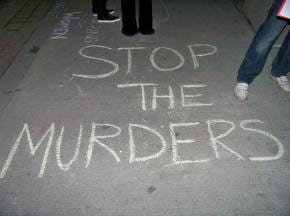It’s a landmark year for the Regent Park Film Festival (RPFF). Ten years old and now settled back in the neighbourhood that inspired it, RPFF is hitting a new and slightly more glitzy stride, though it is dedicated to staying as grassroots as ever. The festival runs until Nov 10.
The program is still selected by a committee that includes members of the community. The festival is still free, and there is still free childcare, as so many of us in the media like to note, as though this is some kind of deliberately charming feature and not totally essential to the communities the festival serves and celebrates.
Though screenings continued to take place in the Lord Dufferin Public School on Parliament Street, RPFF was operated out of the 401 Richmond building for three years when the building that housed its offices was demolished during the revitalization of Regent Park.
Festival director Ananya Ohri is keenly aware that the festival’s new home at Daniels Spectrum involves a dichotomous advantage, putting RPFF in the intersection of the Venn diagram of gentrification, both benefiting and chafing from it. There is a restless quality to this relationship, something that the festival does not shy away from in its programming and panels.
“So many things that happen here happen elsewhere,” Ohri says, referring to the elephant in the room — gentrification being rebranded as revitalization and the positive and negative impacts of that on communities like Regent Park.
“Because of revitalization we have this space. But before the arts and culture building there were homes. The festival sits in the space of speaking to all of these different experiences because of its own history.”
RPFF chose the film Rezoning Harlem to speak to this issue, along with a panel featuring its filmmakers and Regent Park community-health practitioners.
RPFF reflects on its universal connection to inner-city communities. “People of colour, transient populations, marginalized populations, and the process of always being worried about gentrification,” Ohri says. “Stigmatized populations and a lot of hidden pockets of culture that don’t get attention.”
In other words, all the topics that possess creators of mainstream films and festivals but that are often looked at through a gawking, interventionist lens. Fitting then, that a big theme of the festival this year is home.
“There is an emphasis on what home means to people,” Ohri says. “Is it an ephemeral place or is it a physical location?”
RPFF has always had a mandate to support and showcase the diversity and issues of its expansive community, and this year is no different. Opening night traditionally starts out with offerings from young filmmakers and artists. Evenings of shorts with titles like Looking Back, Moving Forward; React and Recover; and Recording Resilience speak very directly to the experiences of marginalized inner-city citizens.
Local documentary maker Hugh Gibson has two films — Harm Reduction and Safer Stroll — in this year’s Recording Resilience program. Gibson was commissioned by the Regent Park Community Health Centre and Street Health to make these films about specific outreach programs they’d had success with because they’re at risk for losing funding. The very relationship that developed between Gibson and these organizations speaks to the objective of the RPFF: at-risk communities at risk of losing even more turning to film to document their value.
Both these films record peer-based street-drug-user and sex-worker outreach programs and look at the harm-reduction model as an agent of compassionate pragmatism.
As an outsider to this world on all levels, Gibson worked to apply the harm-reduction model to his documentation. As one of the women featured in Safer Stroll says, “You can’t talk the talk if you haven’t walked the block.”
Gibson’s subjects were involved in many aspects of creation. “I wasn’t alone in the editing room,” he says. “There was a process of going through the material with the subjects and the social workers.” In being able to choose how they are represented, the subjects help shape a more humane vision not always offered to them.
Ohri acknowledges the uneasiness of change foisted on communities like Regent Park.
“The festival looks at spaces that are provocative,” she says, “and how when we create that discomfort, how we deal with that responsibly afterwards.”
For more information on screenings, panels, workshops and events, visit regentparkfilmfestival.com.

 Why you can trust Xtra
Why you can trust Xtra


